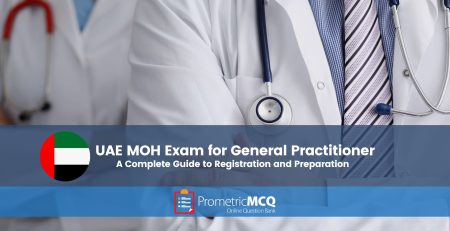
How to prepare for MOH Exam for Nurses
Webmaster2024-04-01T14:11:41+00:00Are you ready to ace the MOH Nursing Exam and secure your licensing in the UAE? Picture this: you’re sitting in the exam hall, facing a series of challenging questions that will determine your professional future. The pressure is on, and every correct answer counts. But how can you best prepare for this crucial moment?
In this blog, we delve deep into the world of MOH Exam for Nurses, offering invaluable tips and insights to help you conquer this milestone with confidence. From effective study strategies to practical test-taking advice, we’ve got you covered. Here’s a sneak peek of what you can expect:
- Expert guidance on navigating the MOH exam landscape
- Insider tips on managing test-taking anxiety and boosting your skills
- Comprehensive resources, including practice tests and study materials
Prepare to embark on a journey towards success in your nursing career by mastering the MOH Nursing Exam.
Table of Contents
ToggleIntroduction to MOH Exam for Nurses
Preparing for the UAE Ministry of Health (MOH) Exam is a crucial step for nurses seeking licensing in the UAE. This comprehensive exam ensures that healthcare providers are equipped with the necessary knowledge and skills to deliver quality care. In this article, we will cover essential steps and strategies to help you succeed in your MOH Exam for Nurses.
As a nurse, passing the MOH Exam is vital for your professional growth and career prospects. It demonstrates your competency in delivering healthcare services and validates your expertise. By obtaining the MOH License for Nurses, you gain recognition as a licensed nurse in the UAE, enabling you to pursue diverse opportunities in both public and private healthcare sectors.
To excel in the MOH Exam, adequate preparation is key. We will guide you through the application process, scheduling the exam, effective study techniques, and handling test-taking anxiety. Additionally, we will provide valuable insights into the benefits of MOH license and address frequently asked questions to ensure your journey towards becoming a licensed nurse is smooth and successful.
With the right resources and diligent preparation, you can confidently approach the MOH Exam and achieve your goal of becoming a licensed nurse in the UAE. Let’s dive into the details and set you on the path to success.
Step 1: Check Eligibility and Apply for MOH Exam for Nurses
Before preparing for the MOH exam, it is essential to check your eligibility and submit the application. Follow these steps to ensure a smooth application process:
- Research Eligibility Criteria: Visit the official website of the UAE Ministry of Health (MOH) to understand the specific requirements for the exam. Ensure that you meet the criteria related to education, experience, and any other prerequisites.
- Gather Required Documents: Collect all the necessary documents, such as academic certificates, work experience letters, and valid identification proofs. Make sure to have them readily available when applying for the exam.
- Complete the Application Form: Fill out the application form accurately and thoroughly. Double-check all the information provided to avoid any errors or discrepancies.
- Submit the Application: Once the application is complete, submit it through the designated online portal or at the MOH office. Keep a copy of the submitted application for your records.
It is crucial to complete this step correctly to proceed with the preparation process effectively. By ensuring your eligibility and submitting an accurate application, you will be on your way to conquering the MOH exam and obtaining your nursing license.
Step 2: Schedule the MOH Exam for Nurses
Scheduling the MOH exam is a crucial step in your journey towards obtaining your nursing license. Follow these instructions to effectively schedule your exam and select a convenient exam date:
- Check the MOH Exam Schedule: Visit the official MOH website or contact the designated authorities to access the exam schedule. It is essential to know the available dates and locations for the exam.
- Review Your Availability: Consider your personal and professional commitments when choosing an exam date. Ensure that you have enough time to prepare adequately without compromising on your other responsibilities.
- Register Online: Most MOH exams now require online registration. Fill out the registration form accurately, providing all the necessary details. Double-check the information before submitting to avoid any errors.
- Pay the Exam Fee: Once you have registered, you will be prompted to pay the exam fee. Follow the provided instructions to complete the payment process securely.
- Confirmation and Exam Details: After submitting your registration and payment, you will receive a confirmation email. It will contain essential exam details such as the exam date, time, location, and any additional instructions.
Remember, scheduling your MOH exam well in advance helps ensure that you secure your preferred exam date and location. Plan accordingly and be prepared to showcase your nursing knowledge and skills on the scheduled exam day.
Step 3: Study and Practice for the MOH Exam
Preparing for the MOH exam requires a focused and disciplined approach. By following these study tips and utilizing the right resources, nurses can increase their chances of success. Here are some effective strategies to help you prepare effectively for the MOH exam:
Create a Study Schedule
- Develop a study schedule that fits your daily routine and allows for dedicated study time.
- Divide your study sessions into smaller, manageable chunks to enhance focus and retention.
- Set specific goals for each study session to stay motivated and track your progress.
Utilize Reliable Study Materials
- Choose reputable study materials, such as textbooks, online courses, and practice tests, to ensure accuracy and comprehensive coverage of the exam topics.
- Look for study resources specifically designed for the MOH exam to align your preparation with the exam requirements.
- Make use of online platforms, like Exam Edge, that offer realistic simulation of the actual exam and provide detailed explanations for correct and incorrect answers.
Engage in Active Learning
- Take notes while studying to reinforce your understanding of key concepts.
- Summarize complex topics in your own words to enhance comprehension.
- Quiz yourself regularly to assess your knowledge and identify areas that need further review.
Join Study Groups or Find Study Partners
- Collaborate with fellow nurses preparing for the MOH exam to share knowledge and insights.
- Discuss challenging topics, share study resources, and quiz each other to reinforce learning.
- Engaging in group discussions can provide different perspectives and help clarify doubts.
Practice with Mock Exams
- Take advantage of practice tests that emulate the format and difficulty level of the actual MOH exam.
- Practice under timed conditions to improve your test-taking speed and accuracy.
- Analyze the results of your mock exams to identify weak areas that require additional focus.
Stay Healthy and Manage Stress
- Get enough sleep to ensure optimum brain function and concentration during study sessions.
- Maintain a balanced diet and make time for physical exercise to keep your energy levels high.
- Practice stress-management techniques, such as meditation or deep breathing, to stay calm during the exam.
Remember, consistent and focused study, coupled with utilizing the right resources, is key to excelling in the MOH exam. By implementing these strategies, nurses can feel confident and well-prepared on exam day.
The MOH exam for nurses demands dedication and thorough preparation. By following a structured study plan, utilizing reliable resources, and engaging in active learning, nurses can increase their chances of success.”
Step 4: Take the MOH Exam for Nurses
When the day of your MOH exam arrives, it’s natural to feel a mix of excitement and nervousness. However, with proper preparation and a few helpful tips, you can approach the exam with confidence. Here’s what to expect on the day of the MOH exam and how to effectively manage any test-taking anxiety:
- Arrive Early: Make sure to reach the exam center well before the scheduled time. This will allow you to settle in, complete any necessary registration procedures, and familiarize yourself with the testing environment.
- Follow Instructions: Listen carefully to the exam proctor’s instructions and guidelines. Understand the format of the exam, including the number of questions, time limit, and any specific instructions for answering.
- Pace Yourself: The MOH exam may have a time limit, so it’s essential to manage your time wisely. Read each question carefully, and allocate enough time to answer each one thoroughly. Skip difficult questions and come back to them later if needed.
- Stay Calm and Focused: It’s normal to experience test-related stress, but don’t let it overwhelm you. Remember your preparation, take deep breaths, and maintain a positive mindset. Stay focused on each question and avoid unnecessary stress or worries.
- Use Test-Taking Strategies: Utilize test-taking strategies such as eliminating obviously incorrect options, guessing when unsure, and flagging questions for review. Trust your knowledge and instincts while making educated choices.
By implementing these tips, you can navigate the MOH exam confidently and perform your best. Remember, the key is to stay composed, trust your preparation, and approach each question with a clear mind. Good luck!
Benefits of MOH License for Nurses
Obtaining MOH License for Nurses offers a multitude of advantages for nurses and opens up exciting career prospects. Here are some key benefits to consider:
- Increased Employability:
MOH License for Nurses is recognized and respected not only in the UAE but also internationally. With this certification, nurses become highly sought after by healthcare providers, leading to improved job opportunities and greater job security. - Expanded Career Options:
Having MOH certification allows nurses to explore various healthcare settings, including hospitals, clinics, and healthcare facilities. This opens doors to diverse job roles and specializations, enabling nurses to pursue their professional interests and passion. - Professional Development:
Through the rigorous process of preparing for the MOH exam, nurses acquire an in-depth understanding of current healthcare practices, policies, and standards. This knowledge enhances their professional skills and capabilities, making them valuable contributors to the healthcare industry. - Competitive Salaries and Benefits
Nurses with MOH License typically enjoy higher salaries and attractive benefits packages compared to their non-certified counterparts. The certification demonstrates their expertise and dedication, which can significantly impact their earning potential. - Personal Fulfillment
Achieving MOH License is a significant accomplishment that brings a sense of pride and personal fulfillment. It validates nurses’ competencies and allows them to serve as trusted healthcare professionals while making a positive impact on patients’ lives.
In conclusion, MOH License offers numerous advantages, from increased employability and expanded career options to professional development and personal fulfillment. By obtaining this certification, nurses unlock a world of opportunities and pave the way for a rewarding and successful nursing career.
FAQs (Frequently Asked Questions):
The UAE MOH (Ministry of Health) Exam for Nurses is a specific licensure examination for nurses who wish to practice in healthcare facilities in the United Arab Emirates. This exam is a mandatory requirement for nurses to ensure they meet the UAE’s healthcare standards. Key aspects of the UAE MOH Exam for Nurses include:
-
Eligibility Criteria: Candidates are typically required to have a nursing degree and a valid professional nursing license. They may also need a certain amount of work experience, depending on the specific rules at the time of application.
-
Exam Format and Content: The exam usually consists of multiple-choice questions covering various nursing topics, such as medical, surgical, pediatric, psychiatric, and community health nursing. The format and content are designed to assess the candidate’s knowledge and skills in nursing practice.
-
Application Process: Nurses must apply for the exam online, submitting required documents such as academic certificates, work experience proofs, a copy of the nursing license, passport, and photographs. The process may also involve verification of documents and a fee payment.
-
Exam Preparation: Candidates often prepare through self-study, utilizing nursing textbooks and online resources. Some may also attend preparatory courses or workshops.
-
Purpose: The exam ensures that nurses have the requisite knowledge and skills consistent with the healthcare standards in the UAE. It assesses the readiness of nurses to work in various healthcare settings within the UAE.
-
Licensing: Upon passing the exam, nurses are awarded a license by the UAE Ministry of Health, which allows them to practice in the country.
-
Validity and Renewal: The MOH license has a certain validity period and must be renewed periodically. This often requires continuing education or professional development activities.
-
Recognition: Holding a UAE MOH license is a significant credential for nurses, as it is recognized across the UAE and often considered a mark of professional competence.
The UAE MOH Exam for Nurses is a critical step for any nurse looking to develop their career in the UAE, offering the opportunity to work in a diverse and rapidly growing healthcare sector.
The UAE MOH Exam for Nurses covers a wide range of topics to ensure that nurses have a comprehensive understanding of various aspects of nursing care. These topics generally include:
-
Medical-Surgical Nursing: This encompasses a broad area covering the care of adult patients in various settings. Topics include the management of patients with diseases or injuries affecting various body systems, like cardiovascular, respiratory, gastrointestinal, neurologic, musculoskeletal, endocrine, and renal systems.
-
Pediatric Nursing: Focuses on the care of infants, children, and adolescents. It covers growth and development, pediatric diseases, immunization, common pediatric emergencies, and child health promotion.
-
Maternity and Obstetrical Nursing: This area covers prenatal care, labor and delivery, postpartum care, and neonatal care. It includes managing normal and complicated pregnancies and deliveries, as well as newborn care.
-
Psychiatric Nursing: Involves the care of patients with mental health issues. Topics may include common psychiatric conditions, their management, psychiatric emergencies, and psychotherapeutic interventions.
-
Community Health Nursing: This covers public health principles, health promotion, disease prevention, community health assessment, and the role of a nurse in the community setting.
-
Nursing Fundamentals: Basic nursing principles, nursing process, patient safety, infection control, and basic care skills.
-
Critical Care Nursing: Management of critically ill patients, emergency nursing, intensive care nursing, and life support measures.
-
Pharmacology: Medication administration, drug classifications, drug actions, side effects, and nursing considerations related to pharmacotherapy.
-
Nursing Ethics and Professionalism: Topics related to ethical issues in nursing, patient rights, confidentiality, professional conduct, and legal aspects of nursing practice.
-
Nursing Management and Leadership: Principles of nursing management, leadership styles, communication, team management, and conflict resolution.
-
Research and Evidence-Based Practice: Basics of nursing research, evidence-based practice, and application of research in clinical practice.
The exam aims to assess a nurse’s knowledge and skills in these areas to ensure safe and effective nursing practice in the UAE’s diverse healthcare environment. Preparation for the exam typically involves a comprehensive review of these topics, often using standard nursing textbooks and practice questions.
The UAE MOH (Ministry of Health) Exam for Nurses is a computer-based test, designed to assess the knowledge and skills of nurses seeking to practice in the United Arab Emirates. The format of the exam is as follows:
-
Nature of Exam: It is a computer-based test, which allows for a standardized testing environment.
-
Number of Questions: The exam consists of 150 multiple-choice questions.
-
Question Types: These questions are designed to assess a range of nursing competencies. Each question typically presents a scenario or a direct question, followed by several answer options.
-
Duration: The total duration of the exam is generally a few hours, allowing candidates sufficient time to answer all questions.
-
Subject Coverage: The exam covers various areas of nursing knowledge and practice. This includes, but is not limited to, medical and surgical nursing, pediatric nursing, psychiatric nursing, community health nursing, and emergency nursing.
-
Scoring and Pass Criteria: The scoring system is usually based on the number of correct answers. There is typically a set passing score or percentage that candidates must achieve to pass the exam.
-
Language: The exam is conducted in English, catering to the diverse, international pool of nursing professionals seeking to work in the UAE.
-
Frequency and Locations: The exam is offered at various times throughout the year, and candidates can take it at designated testing centers.
-
Feedback and Results: Candidates usually receive their results after a specified period post-exam. The results indicate whether the candidate has passed or failed but may not always provide a detailed breakdown of performance.
Preparing for the UAE MOH Exam for Nurses involves a thorough review of nursing concepts and practices, with a focus on the areas most relevant to the UAE’s healthcare context. It’s essential for candidates to be familiar not only with nursing theory but also with practical, real-world nursing scenarios they might encounter in a healthcare setting in the UAE.
To pass the UAE MOH Exam for Nurses, candidates need to achieve a score of at least 60%. This means that out of the 150 multiple-choice questions on the computer-based test, at least 90 questions must be answered correctly.
The eligibility criteria for the MOH Exam for Nurses are quite specific and include several key requirements:
-
Educational Qualification: Candidates must hold a nursing degree or diploma from a recognized institution.
-
Professional Experience: A minimum of two years of nursing experience is required. For doctors, three years of work experience is needed, while for nurses and allied health professionals, a minimum of two years is mandatory.
-
Valid Nursing License: Candidates must possess a valid nursing license from their home country.
-
Professional Credentials Evaluation: All foreign healthcare professionals, including nurses, must go through a phase where their professional credentials are thoroughly evaluated.
-
Dataflow Application: This is part of the Primary Source Verification (PSV) process, essential for verifying the authenticity of candidates’ professional documents.
-
Exam Registration and Scheduling: After meeting the above criteria, candidates must register and schedule their exam.
-
Government-issued ID: For the exam, the candidate must present a valid form of government-issued identification.
It’s important for candidates to ensure they meet all these criteria before applying for the MOH Exam for Nurses. Each of these steps is crucial for eligibility and successful registration for the exam.
Preparing for the UAE MOH Exam for Nurses involves a series of steps and strategies to ensure a comprehensive understanding and mastery of the relevant nursing subjects. Here are some key preparation guidelines:
-
Understand the Exam Format and Content: Familiarize yourself with the structure of the MOH Exam, which is a computer-based test consisting of multiple-choice questions. It covers various nursing topics, including medical-surgical nursing, community health nursing, psychiatric nursing, and pediatric nursing.
-
Review Nursing Guidelines and Protocols: Study the MOH nursing guidelines and protocols. This includes understanding how these guidelines apply in practical, real-world nursing situations.
-
Practice Clinical Scenarios: Engage in practicing various scenarios you might encounter in your nursing practice. This could include patient assessments, medication administration, and patient education.
-
Take Mock Exams: Utilize practice exams to evaluate your readiness. Choose practice tests that mimic the format and content of the actual MOH Exam. This will help you identify areas where you need more study and practice.
-
Join Study Groups: Collaborating with others who are also preparing for the exam can be very beneficial. Study groups offer a platform to discuss material, exchange ideas, and offer mutual support.
-
Utilize Study Materials: There are various study materials available, including those provided by the Ministry of Health or by private institutions. These resources can help you become familiar with the exam content and format.
-
Focus on Time Management: Since the exam is timed, it’s important to practice completing questions within the allocated time. Prioritize answering questions you are confident about before moving on to more challenging ones.
-
Seek Support and Guidance: Connect with nurses who have already taken the MOH Exam for insights and advice. Consider enrolling in review courses or hiring a tutor if necessary.
-
Stay Updated on Syllabus and Current Trends: Make sure to stay informed about any updates in the nursing syllabus and current trends in the field, as these could be reflected in the exam.
-
Regular Revision and Practice: Regularly review all study materials and practice consistently. This should include revising all important topics, concepts, and guidelines.
-
Take Care of Your Well-being: Prepare mentally and physically for the exam. Ensure you are getting enough rest, eating well, and managing stress effectively.
Remember, thorough preparation, consistent practice, and a clear understanding of the exam format are key to successfully passing the MOH Exam for Nurses.
- MOH Nursing Guidelines and Protocols: Familiarizing yourself with the specific nursing guidelines and protocols of the UAE’s Ministry of Health is crucial. This may include local healthcare laws, patient care standards, and ethical practices.
-
Healthcare System Understanding: Having knowledge about the UAE’s healthcare system, including common practices and patient care approaches, can be beneficial.
-
Stay Informed about Current Healthcare Trends: Being up-to-date with current trends and updates in healthcare can sometimes be advantageous, especially in scenario-based questions.
The Primary Source Verification (PSV) process in the MOH Exam for Nurses is a crucial step in the application and licensing process for healthcare professionals wishing to work in the UAE. This process is carried out by the Ministry of Health in partnership with the DataFlow Group. PSV involves verifying the authenticity of the credentials provided by applicants directly from the original issuing source. This verification covers educational degrees, professional licenses, and other relevant qualifications.
The purpose of PSV is to detect any non-genuine certificates and ensure that healthcare professionals practicing in the UAE are legitimate and qualified. This step is mandatory for all health professionals applying for initial licensure or license renewal, especially if their qualifications have not previously undergone PSV. Each document is only required to be verified once, but health professionals may need to repeat the process for newly acquired credentials or qualifications as needed for credentialing purposes.
Documents typically required for the MOH dataflow process include passport-size photos, passport copies, educational certificates, professional registration certificates, experience certificates, Basic Life Support (BLS) certificates, and Good Standing Certificates from medical councils or regulatory bodies.
This verification process serves as a safeguard, ensuring that all healthcare professionals meet the necessary standards of education and practice to provide safe and effective care in the UAE.
The MOH license in the UAE can be renewed, and it’s also possible to transfer it to other registrations like DHA (Dubai Health Authority) or HAAD (Health Authority Abu Dhabi).
For the renewal of MOH licenses for nursing and medical professionals, the process involves:
- Logging into the MOHAP website or smart app using the UAE PASS.
- Filling in the necessary information, attaching the required documents, and submitting the application.
- Upon meeting the requirements, the application will be approved, and the applicant will pay the service fees.
- The license is then issued electronically and sent via email, and can also be downloaded via the website or smart app.
It’s important to note that nursing practitioners are required to complete a certain number of continuing education hours for renewal (20 hours for nursing practitioners and 10 hours for medical and dental technicians).
As for license transfers, healthcare professionals in the UAE have the option to transfer their licenses between the three licensing bodies (MOH, DHA, and HAAD). This service enables healthcare professionals to practice in different regions within the UAE. The process generally involves steps like eligibility checks, gathering necessary documents, application submission, assessment by the respective health authority, fulfilling additional requirements, and paying the applicable fees. Once approved, the respective health authority issues the new license.
Furthermore, transferring the license from one medical facility to another is possible for nurses and other medical professionals. This requires a valid license, a request letter for license transfer, employment contract, a copy of the last license or ID, and a no-objection letter from the previous facility. The process takes about three working days and has an application fee of AED 100.
Each of these processes has specific requirements and steps, so it’s advisable to check the latest guidelines and procedures from the official websites or contact the authorities directly for the most current information.
When preparing for the MOH Exam for Nurses in the UAE, it’s important to focus on a broad range of topics relevant to the nursing profession. The exam is designed to assess the competency of nurses in various areas, ensuring they meet the standards set by the UAE Ministry of Health.
Key areas to focus on include:
-
Medical-Surgical Nursing: This encompasses a wide range of topics related to adult patient care. Understanding various medical conditions and surgical procedures, along with appropriate nursing interventions, is crucial.
-
Community Health Nursing: This involves knowledge about public health, preventive healthcare, and managing health issues in the community setting.
-
Psychiatric Nursing: It’s important to be familiar with mental health conditions and the care and treatment options available.
-
Pediatric Nursing: This covers the healthcare of infants, children, and adolescents, including developmental stages, common pediatric diseases, and pediatric emergency care.
In addition to these subject areas, candidates should be well-versed in MOH nursing guidelines and protocols. They should practice clinical scenarios that may be encountered in nursing practice, such as patient assessments, medication administration, and patient education.
To effectively prepare for the exam, you can:
- Review the format of the exam and familiarize yourself with the types of questions that will be asked.
- Utilize study materials provided by the Ministry of Health or review courses offered by private institutions.
- Practice with mock exams and sample questions to evaluate your readiness and identify areas that need improvement.
- Join study groups to discuss the material with others and gain new perspectives.
Remember that the exam is a computer-based test consisting of 150 multiple-choice questions, with a duration of 3 hours. The passing score is 60%, which means you’ll need to answer at least 90 questions correctly to pass. It’s also vital to practice time management skills, as the exam is timed.
Overall, a well-rounded understanding of nursing concepts and practices, along with disciplined and thorough preparation, is key to passing the MOH exam for nurses.
Candidates appearing for the MOH Exam are allowed a maximum of three attempts to pass the exam. If a candidate is unable to pass the exam within these three attempts, they would typically need to seek further guidance from the relevant regulatory body for additional steps or requirements.
The results of the MOH Exam typically arrive within a span of 2 to 5 days after the exam. This quick turnaround time allows candidates to promptly know their status and plan their next steps accordingly.
Apply for UAE MOH License
Get UAE MOH Prometric Exam Preparation and Licensing Services










